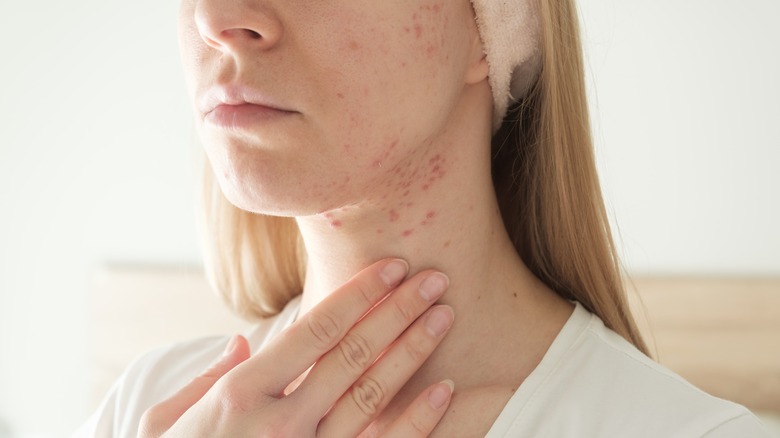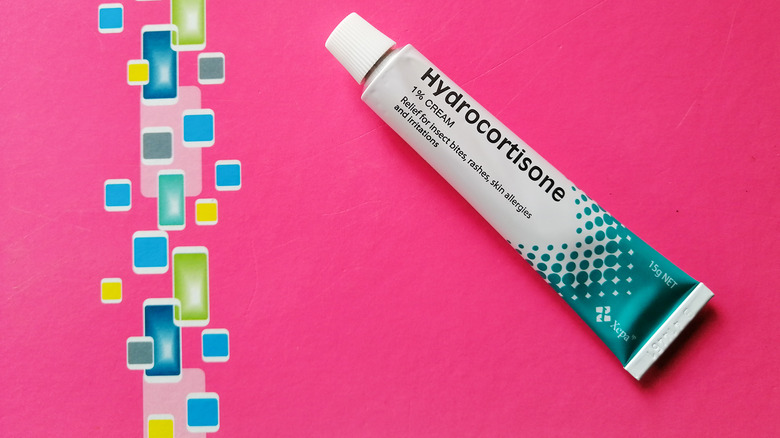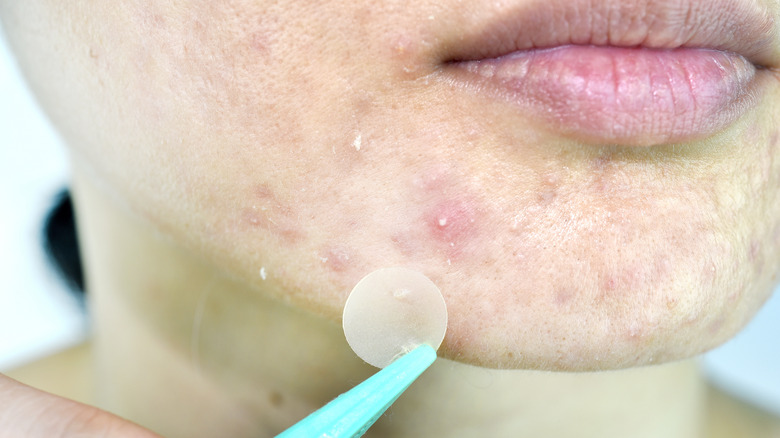Hydrocortisone Is The Unofficial Pimple Medicine That Treats Cystic Acne
All kinds of acne are unwelcome, but cystic acne is notably the worst possible type of acne one could get. These are the angry and painful bumps that form under the surface of your skin, and more often than not, they're also the toughest ones to clear.
Board-certified dermatologist Dr. Joshua Zeichner told InStyle that cystic acne is considered a "severe" type of acne because it's skin deep, while Dr. Brian Hibler noted that it manifests through "deeper, often tender nodules" with "individual lesions" that are "often bigger than regular acne bumps and persist for a longer duration before resolving." In short, since cystic acne develops beneath many skin layers, it takes more than an over-the-counter spot treatment to treat it. It's also caused by a number of factors, and not just because you accidentally slept with your makeup on. "There are many causes for cystic acne in adults," Dr. Kristina Goldenberg, co-founder of Goldenberg Dermatology, shared with Yahoo! Life. "These include hormonal changes, diet, stress, use of [certain] makeup or skin care products, and, of course, genetics."
Cystic acne can unfortunately lead to scarring if not treated correctly. And while it's recommended that you enlist the help of a professional to eliminate it, there are things you can do on your own to reduce its appearance — one of them is applying hydrocortisone cream.
Hydrocortisone can help shrink cystic acne
Hydrocortisone is not the end-all-be-all cure to cystic acne, but it's touted by experts because it can do wonders in reducing inflammation. Dermatologist Dr. Brandith Irwin defined hydrocortisone to PopSugar as a "low-strength anti-inflammatory cream in the steroid family that is sold without a prescription." It's a type of steroid that helps resolve a variety of skin-related concerns, including redness, swelling, and itching. However, Medical News Today notes that though it can calm down pimples, it's not capable of targeting whatever it is that's causing your cystic acne.
Hydrocortisone is only ideal if you wish to try a temporary solution to cystic acne. Dr. Irwin told PopSugar that even then, it should be used sparingly, only "a small amount once or twice a day for three days." It's not recommended for use beyond that since it "can mask the symptoms of more serious problems like staph infections and several other skin diseases." Fortunately, there's an alternative solution, and it comes in the form of an item you have on your fridge — ice.
"The reason a cystic pimple is painful is because of swelling and inflammation in the tissue," Dr. Mona Gohara, associate clinical professor at Yale School of Medicine, explained to Cosmopolitan. "Ice can help constrict your blood vessels and bring down the swelling a bit." Simply wrap a cube or two in a towel, apply it against the affected area for a minute or two, and watch the frozen water do its thing.
Can I get rid of cystic acne completely?
The good news? You can totally clear cystic acne. The bad news? It doesn't happen overnight. According to Cleveland Clinic, it may take a minimum of three months to get rid of it completely — even more if your case is particularly severe — and treatment involves antibiotics and topical products that can only be prescribed by doctors. Hormone regulators, retinoids, and treatments like Accutane are known to help as well.
If you're already going through treatment, Dr. Joshua Zeichner told Allure that you could dodge cystic acne further by making lifestyle changes, like avoiding foods that "have been associated with the worsening of acne," like dairy and whey protein. He also suggests eating healthier and not subjecting yourself to stress. "The same hormones that prepare our bodies to deal with stressful situations also push our oil glands into overdrive," he explained.
And while it's frustrating to have cystic acne, you shouldn't be too hard on yourself. Dr. Mona Gohara noted that sometimes, it's not you — it's your body and your environment. "Honestly, your risk of developing cystic acne only partially has to do with how you take care of your skin," she told Cosmopolitan.


